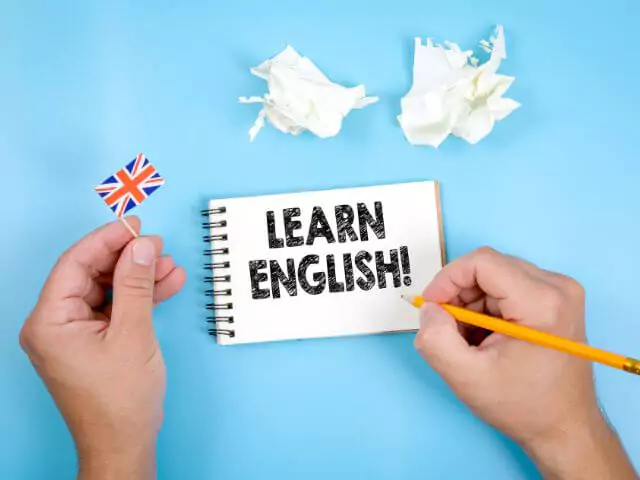No matter what route you take in life, one thing that’s certain is you will face numerical and literacy-related challenges in both a personal and professional capacity on a regular basis. Simply put, you can’t go a day without using Maths and English in some way, shape or form.
This might be hard to believe initially, but we assure you, from composing a text message to checking the next arrival on a bus timetable, you use Maths and English skills more than you realise.
Despite being such valuable skills, the issue with the nation’s lack of numeracy and literacy abilities is well documented. In fact, recent studies have shown that 9 million adults have low literacy or numeracy across England, and there has been more than a 60% drop in the number of adults completing English and Maths studies since 2012.
This aversion to Maths and English subjects is seeing many individuals miss out on an abundance of opportunities in later years, but it’s also impacting people in terms of their health and mental well-being.
Until people realise the life-long value of Maths and English, the issues stemming from poor Maths and English skills continue to spiral. To help, we’ve provided a detailed insight into the importance of English and Maths, and what is being done to boost people’s understanding and confidence in these core subjects.
The Everyday Use of Maths and English
Probably the best way of beginning to paint a picture of the real value of learning Maths and English is by giving examples of how these skills allow you to function in everyday life.
The UK’s education system has an excellent reputation across the globe, but it is also renowned for being a bit old-fashioned in its approach. This means the rather traditional way Maths and English GCSEs and other courses are delivered fails to teach learners these subjects in relatable terms, which can make them seem overly complicated and not all that useful to them.
The truth is, without the knowledge gained in Maths and English courses, you will fail to have full control over certain things in your life. This is because both English and Maths subjects encompass basic, underlying principles that play out in the real world all around us.

For instance, understanding Maths is important because it allows people to take complex processes and make them more manageable, by applying structure, patterns and rules. This is a skill that transfers to many situations in both professional and personal contexts, for instance, making sense of personal data like the deductions on your payslip.
Other daily examples of using Maths include:
- Calculating discounts when shopping
- Preparing food and reading recipes
- Figuring out distance, time, and travel expenses
- Understanding loan terms and repayments
- Managing your money and understanding what you will have left once all bills are paid
These few examples help you see why studying Maths is essential to develop the appropriate mental tools for dealing with the complex realities of life.
English is also just as important because anything you do that involves other people is done through the medium of language. If you have a poor grasp of your own language this will affect the standard of everything else you do in life. You can have fantastic ideas, but language is what helps you articulate them and bring them to life. If you cannot put your concepts into words, no one will ever know about them.
Other examples of the daily use of English skills include:
- Communicating your feelings to your partner
- Drafting an email to colleagues
- Sending a text
- Understanding the storyline of films and TV series
- Getting important points across in a meeting
Without English and Maths skills, none of the above would be possible, which is why Maths and English are classed as core subjects. In short, they are essential building blocks for any career and can be the difference between people finding and sustaining employment, or not.
The Governments Push on Maths and English
Being detrimental to our everyday success, the government has been actively working towards reducing the nation's skills gap in English and Maths subjects. Over recent years, several significant steps have been taken to improve the educations systems approach to teaching pupils these subjects, in order to increase the standard of English and Maths in England.
These include:
- Education Secretary Nadhim Zahawi releasing plans to provide targeted and tailored support to pupils in schools who fall behind in English and Maths
- Reforming Maths and English GCSEs and providing additional support so more learners can gain good grades
- Allocating more funding to providers teaching English and Maths GCSEs to adults, outside of apprenticeships
- Commissioning a review to determine the best way to achieve and accredit alternative Maths and English GCSE qualifications
- Upwards of £30 million invested over 2 years to enhance the further education workforce
- Implementing research programmes to understand the challenges faced by learners and Teachers in Maths and English, to better invest in these areas of education

These significant initiatives further attest to the importance of Maths and English skills, not only for children and young people in education but for adults that left the education system without the required level of knowledge.
Why Are Maths and English Important Exactly?
Now the daily use of English and Maths skills has been established, let’s take a look at the more precise reasons why Maths and English skills are needed to succeed and thrive in society.
Here are five detailed reasons why English and Maths are so important:
1. Further Study Opportunities
If you do poorly in English and Maths in school, not only will you struggle with numeracy and literacy obstacles going forward, but your uptake of other subjects will likely also be hindered.
This is because many of the other subjects studied in the curriculum involve tasks like:
- Measuring
- Weighing
- Drafting
- Understanding chemical formulas
- Calculating statistics
- Analysing data
- Presentations
- Writing assignments and essays
All of the above heavily rely on the principles of Maths and English, which is why these subjects are considered essential foundations for all other learning to take place with effect.
More specifically, the crossover of Maths and English skills in other subjects can be seen in:
- Science and Technology – Learners are required to read scientific charts and graphs, use complex Math to solve Chemistry problems, analyse scientific research, solve equations for computer programs and algorithms, read complex and dense findings and write their own
- Literature and Writing – Arithmetic skills can help learners understand and craft poetry by helping them calculate the number of words required for effective rhythms
- Social Studies – These subjects require the review of historical and current data through charts and graphs, plus wider reading and the creation of persuasive arguments
- The Arts – To follow musical rhythm for dance or instrumental purposes you will need to read the mathematical series used at their base. Artists with geometry knowledge can better draw and use shape and form in their work, and language skills are essential to grasp a concept and communicate the ideas behind the work created
For these reasons, it’s clear to see why many further education and university courses require a good level of English and Maths, regardless of the subject you plan to study. Typically, Level 2 are the minimum Maths and English qualifications required, with Level 2 being equivalent to GCSE grade 4 or higher (old grading system A*-C).
2. Employment Opportunities
If you’re wondering ‘Why is Maths and English important in the workplace?’, we have the answer! You might feel that Maths qualifications would only be required for jobs directly involving numbers and equations, like being an Accountant. In addition to writing professionals perhaps being some of the few who require English qualifications to evidence their ability.
The truth, however, couldn’t be further from it, as Maths and English skills are essential for performing almost every job there is.
Now, employers don’t need you to be a mathematician in most cases, however, the vast majority do look for applied and practical Math skills in their employees. When asked, employers state they are often less interested in academic Maths skills like algebra and calculus, and instead look for candidates who can:
- Approximate
- Use mental arithmetic
- Read and interpret visual data
- Understand units of measurement
- Solve simple problems
- Check their own calculations
The same can be said when it comes to English skills. The majority of jobs don’t need you to write the equivalent of War and Peace, but they do need you to be able to read, write, speak and listen effectively.
A major survey of skill levels among adults in work found that, for employers, English skills are of greatest concern. In particular, this stemmed from poor communication skills (listening and speaking) such as good writing, spelling, grammar and vocabulary.
Many employers have flagged issues in potential recruits and young employees as they have demonstrated a lacking ability to put together emails, have used text speak rather than properly constructed sentences, and have poor spelling and communication skills.
With English and Maths skills being so detrimental to almost every role, candidates lacking these have the potential to damage the company’s reputation through their poor-quality work. So, it’s no surprise then that Maths and English qualifications are often a barrier to entry for employment opportunities.
To further stress the point, a report from the National Literacy Trust found:
- People with low Maths skills are twice as likely to be unemployed
- 95% of UK jobs require employees to be able to read
- Almost two-thirds of men and three-quarters of women with poor literacy skills have never received a promotion
- When asked which was the most cause for concern, 46% of employers said English skills were the most concerning, 17% were worried about Maths and 26% said both English and Maths skills were equally concerning

As such, it is clear to see that employers are prioritising job applicants with Maths and English understanding. Many of them value skills over Maths and English qualifications, however, qualifications are the quickest way to evidence the skills they require.
Maths and English GCSEs are qualifications they trust and are traditionally set as the benchmark for a number of job opportunities. However, GCSE grade equivalents are also a great way to prove you have the knowledge required to be an asset to their business.
3. Income
In light of the above, it’s no surprise that how well a person does at school and their development of early reading skills are directly linked to higher earnings. In fact, if you get good Maths and English GCSE grades you are likely to earn at least £2,000 a year more than people with poor GCSE grades.
More studies have shown that children who are good at Maths from a young age earn more than other similar children by the age of 30.
4. Mental Health
In addition to helping you excel in other areas of education, secure employment and earn a substantial living, having English and Maths knowledge and exercising these skills is also vital for your mental health.
Recent studies have shown that a particular part of the brain is engaged when you complete mental Math exercises, and this is shown to be directly connected to better emotional health. Evidence now suggests that the dorsolateral prefrontal cortex is stimulated through solving memory-based Math problems, and higher activity in this area leads to fewer symptoms of anxiety and depression.
In a similar vein, studies into reading for mental health have shown that reading different forms of text has many instant and long-lasting benefits on mental health. So much so that ‘bibliotherapy’ is now actively used to combat symptoms of mental health issues and enduring disorders.
Interestingly, reading both poetry and prose activates the left and right sides of the brain, so both the logical and creative thinking sides get a healthy workout. By reading fiction, you will prevent cognitive ageing and your chances of getting dementia.
In addition to this, reading has also been shown to help people currently living with dementia, as well as alleviate symptoms of depression. Generally, indulging your English skills by reading various texts encourages mindfulness and can help individuals start and maintain positive change in their lives.

English skills are also highly beneficial for mental health issues and enduring disorders as they help people to better articulate their thoughts, feelings and emotions, which is essential for receiving effective support.
Contrastingly, recent studies are also highlighting the emerging link between people with low levels of English and Maths and poor mental health. In younger people, these are shown to be the social, emotional and behavioural difficulties that often lead to playing truant from school. On a more severe level, crime may become an issue too since 65% of adult prisoners have low Maths skills.
5. Life
As highlighted, it’s impossible to go a day without using English and Maths. So, having these core skills is the ticket to getting a grip on important elements of your life like your finances, but also so you can understand and get actively involved in social issues like politics and current affairs.
Without Maths and English skills, a simple task or concept can be incredibly daunting and leave you feeling confused. This can lead to feelings of inadequacy, a lack of confidence and isolation, all of which will no doubt impact a person’s mental health.
This is why studying and understanding English and Maths is important for your self-esteem, and children and adults with these skills are more likely to take on new challenges and chase their ambitions.
With English and Maths skills, you will have more confidence, be able to access higher education, gain rewarding employment and earn more in life. As such, besides having a better quality of life, people who are educated in English and Maths are also shown to have a longer life expectancy. So, it really is good news all around!
How to Get Better at Maths and English
If you’re reading this wanting to face your fear of Maths and boost your literacy skills, you’re in the right place! It’s never too late to educate yourself in any subject, but the importance of developing English and Maths skills as an adult learner is clear.
However, if you found Maths and English GCSEs difficult in your school years, you will no doubt be daunted by the prospect of completing these a second time. The great news is sitting a retake Maths and English GCSE isn’t your only option, which is ideal since most adult students find learning Maths and English easier if it is taught in a work-related context.

As such, several GCSE grade equivalents have been created to suit this learning style while meeting the evolving needs of employers. Functional Skills are one such GCSE equivalent qualification, as they are designed to provide an alternative route to traditional qualifications that instead focus on preparing you for work and life. Functional Skills courses can also be used to reach higher level study, like A Level study, university and apprenticeships, as when studied at Level 2, they provide you with the same as a GCSE grade C/4.
Functional Skills Maths and English courses teach you the practical application of both subjects, to help you gain the most from life, learning and work. For these reasons, Functional Skills are now the most widely used GCSE alternative qualifications, and employers are welcoming them as they recognise their approach to teaching learners applied skills, problem-solving and analysis through diverse assessments.
If you would like to boost your Maths and English skills, for any of the reasons or all mentioned above, Functional Skills Level 2 Maths and English courses are the quickest way of gaining credible and recognised skills in these subjects.
With these qualifications to your name, you will have the tools and confidence to become a skilled and valuable member of society.
Enrol Now
The evidence is clear: both Maths and English skills are essential in everyday life, not only for work purposes, but for our emotional, social, and physical wellbeing.
You can revisit these subjects and acquire the knowledge and skills you need for success conveniently and quickly, through the use of online education. learndirect is the UK’s leading online course provider, with distance learning courses in Functional Skills Maths, Functional Skills English and Functional Skills ICT.
With our online training courses, your learning is nothing like it was at school – no classrooms, no Teacher watching over your shoulder and no strict timescales to stick to.
So, why not take a look at our online Functional Skills courses? You can work through them on your terms, at your pace, and receive all the help you need from our specialist tutors.
Find out more now by calling our Course Advisors on 01202 006 464, contact us online or click below to explore the online Functional Skills Level 2 English and Functional Skills Level 2 Maths courses we offer!




















